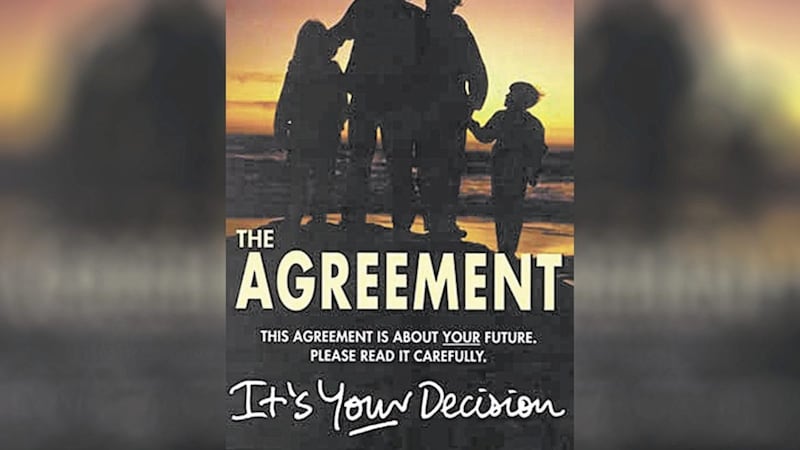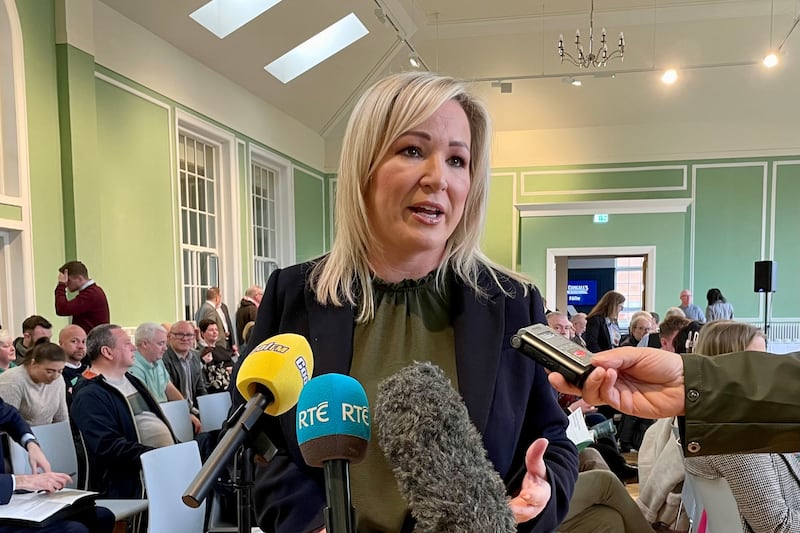A timeline of events in the years before and after the Good Friday Agreement:
1988
January - Talks get under way between Gerry Adams and his main nationalist rival, the SDLP leader John Hume, to see how a political settlement in Northern Ireland could be achieved.
September - The Hume-Adams dialogue breaks down.
1991
January - Martin McGuinness takes part in British Government approved secret talks with MI6's Michael Oatley about ending the conflict.
1993
April - John Hume and Gerry Adams resume their dialogue.
October - The SDLP and Sinn Fein leader pass proposals to Irish Taoiseach Albert Reynolds on how to end violence and secure a permanent peace. Two months later, Mr Reynolds and Prime Minister John Major produce the Downing Street declaration setting out their vision for securing peace.
1994
August 31 - The IRA announced "a complete cessation of military activities", to be followed 43 days later with a similar ceasefire announcement by the main loyalist paramilitaries.
1995
May 10 - First official meeting in 23 years between Sinn Fein and a British Government minister.
1996
February 9 - The IRA ended its 17-month ceasefire with the bombing of London's Docklands and the killing of two innocent civilians. Government breaks off links with Sinn Fein.
1997
May 16 - Within days of becoming Prime Minister, Tony Blair delivers a keynote speech in Belfast, warning republicans: "The settlement train is leaving. I want you on that train."
July 20 - The IRA reinstates its ceasefire to enable Sinn Fein to take part in talks.
September 17 - As Sinn Fein enters the talks at Stormont chaired by former US Senator George Mitchell, the DUP and other hardline unionists walk out. David Trimble's Ulster Unionists remain.
1998
April 10 - The Good Friday Agreement is signed and is endorsed a month later in a referendum by 71.12% of the people of Northern Ireland.
June 25 - The Northern Ireland Assembly Elections see the Ulster Unionists and nationalist SDLP emerge as the largest parties.
July 1 - David Trimble and SDLP deputy leader Seamus Mallon are elected First and Deputy First Minister at the Assembly's first meeting. However the UUP refuse to form a devolved government until the IRA disarms.
August 15 - The Real IRA bomb in the Co Tyrone market town of Omagh was the single deadliest atrocity in the history of the Troubles, claiming the lives of 29 people, including a woman pregnant with twins.
1999
November 29 - After much wrangling the Assembly finally met and nominated executive ministers - only to be suspended the following February by Northern Ireland Secretary Peter Mandelson because of the IRA's failure to decommission any of its weapons.
2000
May 29 - Unionists agreed a return to Stormont and resumption of devolution on the basis of the arms issue being dealt with while the Assembly continued to function.
2002
October 14 - Devolution again suspended as power sharing fell apart over allegations of an IRA spy ring gathering intelligence at the heart of government.
2003
November 26 - Fresh Assembly elections saw Rev Ian Paisley's Democratic Unionist Party emerge for the first time as the largest party and Sinn Fein as the major voice of nationalism. Mr Paisley warned he would not sit in Government with Sinn Fein while the IRA retained weapons.
2005
July 28 - The Provisional IRA announced a formal end to its armed campaign, ordered units to dump all arms and pursue their goals through exclusively peaceful means.
2006
October 13 - Prime Minister Tony Blair and Irish Taoiseach Bertie Ahern lay the foundations for a new devolution deal between the DUP and Sinn Fein. As part of the deal, Sinn Fein signs up in January 2007 to supporting policing on the understanding that that will lead to the DUP sharing power.
2007
March 6 - Following Sinn Fein's decision to endorse the police in Northern Ireland, the province went to the polls and returned both the DUP and Sinn Fein with increased numbers of seats.
May 8 - The Rev Ian Paisley becomes First Minister and Martin McGuinness is appointed Deputy First Minister at the head of the new power-sharing Executive two months after their parties triumph in an Assembly Election and then strike a deal to revive devolution. The pair's surprisingly warm relationship leads to them being referred to as the Chuckle Brothers.
2009
March - Police investigate the murders of soldiers Mark Quinsey, 23, from Birmingham, and Patrick Azimkar, 21, from London, by the Real IRA at Massereene Barracks in Antrim, and the murder of Pc Stephen Carroll, 48, by gunmen from the Continuity IRA in an attack in Craigavon.
Martin McGuinness branded the gunmen traitors to Ireland who had defied the expressed wishes of the Irish electorate which had endorsed the political structures born out of the Good Friday Agreement.
June 18 - It emerges that the Ulster Volunteer Force has carried out a significant act of decommissioning, with expectations that the Ulster Defence Association (UDA) will follow suit.
2010
January 6 - The UDA announces that it has decommissioned all its weaponry.
2012
A vote at Belfast City Council in December to limit the days the Union flag flies from Belfast City Hall leads to street protests across Northern Ireland by Ulster loyalists. Most involve protesters blocking roads and some lead to riots. The vote to limit the flying of the flag increases tension between the two biggest parties.
2013
The flag protests continue. Tensions between Sinn Fein and the DUP are heightened when the DUP withdraws backing for a Peace and Conflict Resolution Centre on the site of the old Maze Prison, which housed paramilitary prisoners during the Troubles from 1971 to 2000. Sinn Fein accuses Mr Robinson of caving in to hardline unionist opinion.
Richard Haass, the former US envoy to Northern Ireland, is brought in as an independent chairman of an all-party group set up to deal with divisive issues such as parades and protests, flags, symbols, emblems and related matters stemming from the past. Months of talks break up at Christmas without agreement.
2014
A crisis over welfare threatens to bring down power-sharing when Sinn Fein refuses to implement reforms demanded by London. Following 11 weeks of discussion, an agreement - known as the the Stormont House Agreement - is reached in December.
2015
Devolved government again faces possible collapse over a fresh welfare reform row between DUP and Sinn Fein. Devolution is already hanging by a thread after the murders of two former IRA men in Belfast in August. The chief constable of Northern Ireland, George Hamilton, says individual Provisional IRA members were behind the killing and the organisation still exists.
Crisis talks lasting 10 weeks result in the Fresh Start Agreement, a deal between the British and Irish governments and Northern Ireland's two largest parties to find a way forward on paramilitarism and welfare reform.
2016
June - Press Association reports allegations of a multimillion-pound "cash for ash" scandal in relation to the Renewable Heat Incentive (RHI) eco-scheme. In response, auditors confirm they are investigating.
December 16 - Martin McGuinness calls on Arlene Foster - the minister in charge of the department at the time RHI was set up - to "stand aside" as First Minister while the "cash for ash" scandal is investigated. Mrs Foster replies that she will not be stepping aside and "does not take her instructions from Sinn Fein".
2017
January 9 - Martin McGuinness resigns as Deputy First Minister in protest at the DUP's handling of the RHI scandal.
January 23 - Michelle O'Neill is named as the new leader of Sinn Fein in the north.
March 21 - Martin McGuinness dies from a rare heart condition aged 66.
2018
February 14 - Sinn Fein and DUP talks fall apart on Valentine's Day over disagreements about Irish language legislation. The two parties were reportedly close to a deal to restore powersharing, more than a year after the executive collapsed.
April 10 - 20th anniversary of the Good Friday Agreement.







